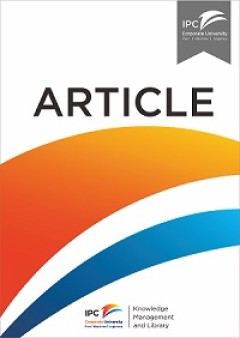Ditapis dengan

Complexity and variety in mass customization systems: analysis and recommenda…
To identify and examine the origins of complexity in a mass customization system and to propose an effective application sequence of variety management strategies in order to cope with this complexity.
- Edisi
- Vol. 44 No. 7, 2006 pp. 908-929
- ISBN/ISSN
- 0025-1747
- Deskripsi Fisik
- 24 p
- Judul Seri
- Management Decision
- No. Panggil
- TXT LO BLE c C.1

A model of supply chain and supply chain decision-making complexity
The objective of this paper is to develop a comprehensive model of supply chain and supply chain decision-making complexity that provides an understanding of the drivers of supply chain complexity and strategies to manage supply chain and supply chain decision-making complexity and outcomes.
- Edisi
- Vol. 41 Iss 1 pp. 63-82
- ISBN/ISSN
- 0960-0035
- Deskripsi Fisik
- 42 p.
- Judul Seri
- International Journal of Physical Distribution & Logistics Management
- No. Panggil
- ATC LO MAN a

“Smart Parts” Supply Networks as Complex Adaptive Systems: Analysis and I…
Purpose – The purpose of this paper is to critically analyze whether supply networks may be validly treated as complex adaptive systems (CAS). Finding this to be true, the paper turns into the latest concerns of complexity science like Pareto distributions to explain well-known phenomena of extreme events in logistics, like the bullwhip effect. It aims to introduce a possible solution to h…
- Edisi
- Vol. 38 Iss 2 pp
- ISBN/ISSN
- /0960-0035
- Deskripsi Fisik
- 2008
- Judul Seri
- International Journal of Physical Distribution & Logistics Management
- No. Panggil
- ATC LO WYC s
The rise of the new east : business strtegies for succes in a world of increa…
- Edisi
- -
- ISBN/ISSN
- 9781137370068
- Deskripsi Fisik
- 242 p.
- Judul Seri
- -
- No. Panggil
- TXT MG SIM t
- Edisi
- -
- ISBN/ISSN
- 9781137370068
- Deskripsi Fisik
- 242 p.
- Judul Seri
- -
- No. Panggil
- TXT MG SIM t

Moving beyond the systems approach in SCM and logistics research
The purpose of this paper is to provide a paradigmatic reflection on theoretical approaches recently identified in logistics and supply chain management (SCM); namely complex adaptive systems and complexity thinking, and to compare it to the dominant approach in logistics and SCM research, namely the systems approach. By analyzing the basic assumptions of the three approaches, SCM and logistics…
- Edisi
- Vol. 42 No. 8/9, 2012 pp. 764-783
- ISBN/ISSN
- -
- Deskripsi Fisik
- 22 p.
- Judul Seri
- International Journal of Physical Distribution & Logistics Management
- No. Panggil
- ATC LO NIL m

Leadership in the age of complexity : from hero to host
For too long, too many of us have been entranced by heroes. Perhaps it’s our desire to be saved, to not have to do the hard work, to rely on someone else to figure things out. Constantly we are barraged by politicians presenting themselves as heroes, the ones who will fix everything and make our problems go away. It’s seductive image, an enticing promise. And we keep believing it. Somewhere…
- Edisi
- -
- ISBN/ISSN
- -
- Deskripsi Fisik
- 5 p.
- Judul Seri
- -
- No. Panggil
- ATC LE WHE l

When should advanced planning and scheduling systems be used in sales and ope…
The purpose of this paper is to explore how the context affects successful use of advanced planning and scheduling (APS) systems in sales and operations planning (S&OP) processes, and how individual, technological, and organizational (ITO) dimensions affect this procedure .
- Edisi
- Vol. 34 Issue: 10, pp.1338-1362
- ISBN/ISSN
- -
- Deskripsi Fisik
- 27 p.
- Judul Seri
- International Journal of Operations & Production Management
- No. Panggil
- ATC LO JON w

Cost modeling in logistics using time-driven ABC: Experiences from a wholesaler
The purpose of this paper is to describe the experiences of a wholesaler with time-driven activity-based costing (TDABC). Three research questions are addressed: How are complex logistics operations modeled by TDABC? Does TDABC provide more accurate cost information than activity-based costing (ABC)? How is TDABC cost information used?
- Edisi
- Vol. 38 No. 3, 2008 pp. 172-191
- ISBN/ISSN
- -
- Deskripsi Fisik
- 22 p.
- Judul Seri
- International Journal of Physical Distribution & Logistics Management
- No. Panggil
- ATC LO AND c

A model to determine complexity in supply networks
The purpose of this paper is to further advance an existing supplier evaluation model for the purpose of identifying those supplier relations which predominantly threaten or worsen a company’s performance. A defined basic set of parameters to determine complexity facilitates the identification of critical locations within a supply network (SN) under certain business conditions.
- Edisi
- Vol. 23 No. 8, 2012 pp. 1015-1037
- ISBN/ISSN
- -
- Deskripsi Fisik
- 25 p.
- Judul Seri
- Journal of Manufacturing Technology Management
- No. Panggil
- ATC LO GER a
 Karya Umum
Karya Umum  Filsafat
Filsafat  Agama
Agama  Ilmu-ilmu Sosial
Ilmu-ilmu Sosial  Bahasa
Bahasa  Ilmu-ilmu Murni
Ilmu-ilmu Murni  Ilmu-ilmu Terapan
Ilmu-ilmu Terapan  Kesenian, Hiburan, dan Olahraga
Kesenian, Hiburan, dan Olahraga  Kesusastraan
Kesusastraan  Geografi dan Sejarah
Geografi dan Sejarah